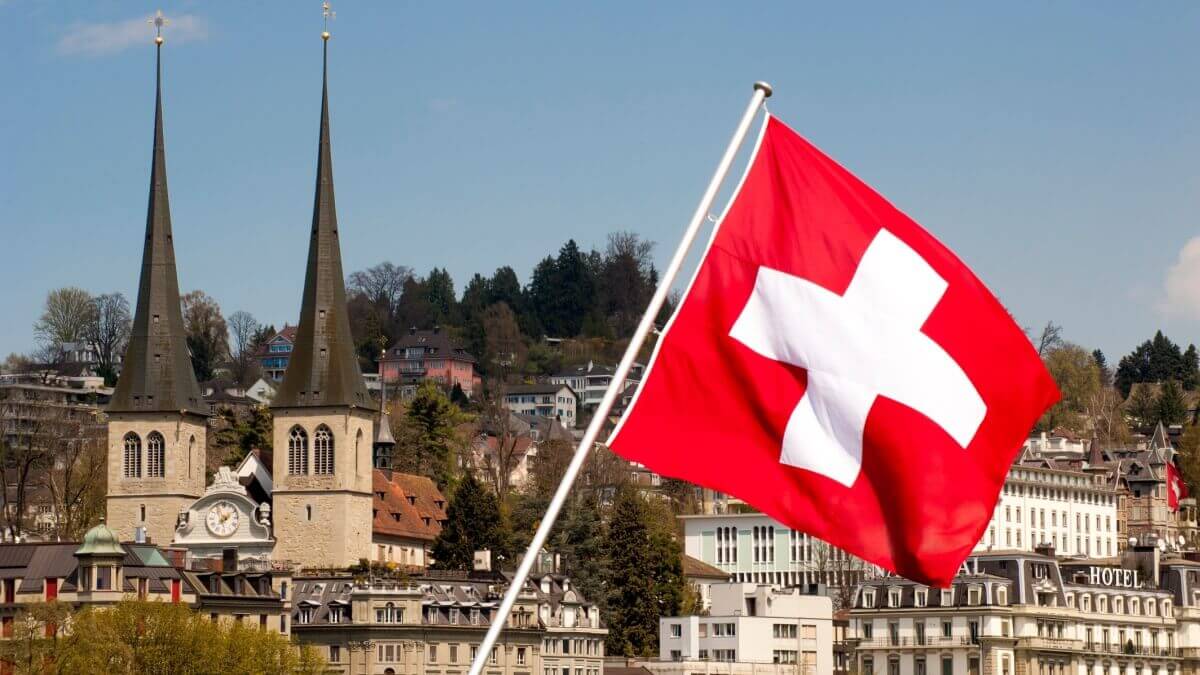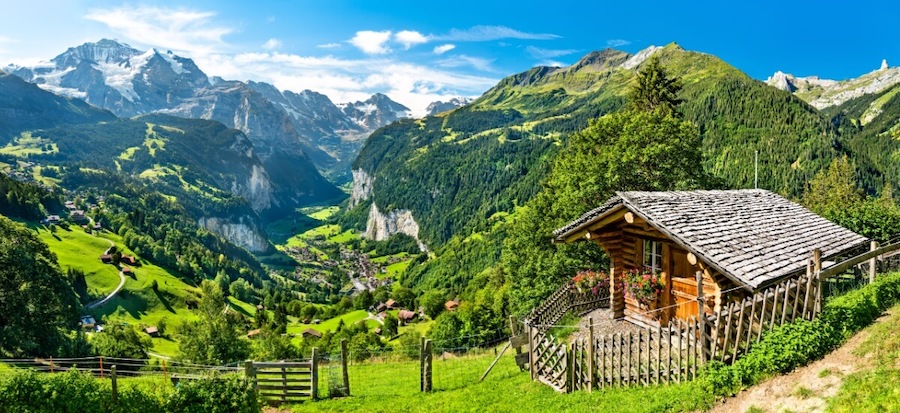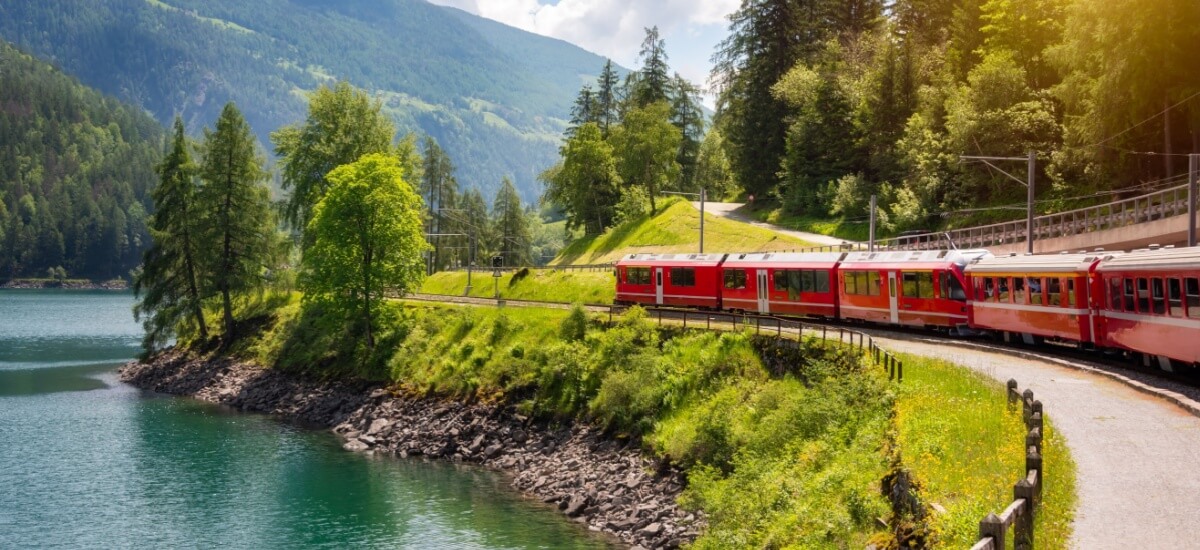Inheritance tax in Switzerland: What you need to know
Discover everything you need to know about inheritance tax in Switzerland. Our comprehensive guide covers the rates, who pays, how to calculate, and much more.

Planning to move to Switzerland from the UK? You might be planning to work in cosmopolitan Zurich, study in vibrant Basel or retire in beautiful Bern.
Alternatively, you might be thinking of buying a holiday home or investment property in the country.
Whatever your plans, we’re here to help with a complete guide to buying property in Switzerland as a foreigner. Below, we’ll take a step-by-step look at the process of purchasing a home, along with info on Swiss property prices and tips on how to start your search.
If you’re looking for ways to save money on currency exchange when buying property in Switzerland, check out the money services provider Wise. You can send large transfers with Wise for low fees* and great exchange rates - making it ideal if you’re sending a secure international transfer.
Before you start your house hunt, it can be useful to know a little about how the process of buying property works in Switzerland.
One major difference between property purchases in the UK and Switzerland is the use of a notary. These are public officers who work for both buyer and seller, and they complete the paperwork, legal work and transfer of funds. They’re an essential part of buying or selling a property in Switzerland.¹
Here’s an overview of the steps involved:¹
The first thing to do is get your finances in order, set your budget and define exactly what you’re looking for. Then you can use online property portals and/or local estate agents to find properties - we’ll give you some tips on where to start your search later in this guide.
You might need to have your mortgage offer in place before you can attend viewings.
If you find somewhere you like, move fast. The property market in Switzerland can be very competitive, so it’s smart to arrange viewing appointments as quickly as possible.
Once you’ve found your dream home, you’ll need to make an offer or bid to the real estate agent or directly to the seller. Be prepared to show proof of how you’ll finance the purchase at this stage, such as your mortgage agreement or a letter from your bank or lender.
If your offer is accepted, the next step is for both parties to sign the reservation contract. This is legally binding, and also requires the transfer of the deposit - this is held in escrow by the appointed notary.²
A written agreement will be produced which outlines circumstances in which a deposit will be returned or forfeited (i.e. if one party pulls out of the transaction).
Before you reach this legally binding stage, a quick note about building surveys and inspections. They aren’t common in Switzerland, but you might still want to get one. It could give you warning of any potentially serious or expensive-to-fix problems - especially if you’re buying an older property.
With your offer accepted and the paperwork underway, you’ll need to let your mortgage provider know. The lender will run through some final paperwork for you to complete.
The sale contract or deed of sale will be drawn up by the notary, who will also complete the final steps required to complete the purchase. This includes completing the official transfer of the property and registering the change of ownership with the land register. ¹
You’ll need to sign all documents and transfer the remaining balance.
And apart from settling fees and taxes (which we’ll look at shortly) this is the purchase complete. You’ll get the keys to your new home, and can settle into your new life in Switzerland.
| 💡 Read more: How to transfer large amounts of money from the UK? |
|---|
Swiss banks do offer mortgage loans to foreigners, but only if you have a Swiss residency permit (B or C). This means you can’t apply if you’re living outside the country - you’ll need to wait until you’ve moved there.³
It’s not absolutely essential to have a Swiss bank account in order to get a mortgage, but it would make the process easier.
It’s also useful to know that the maximum mortgage loan you can get is 80% of the property’s purchase price.³
In order to apply for your mortgage, you’ll need to provide certain details and documents. The requirements will vary between banks, but generally you’ll need:³
It’s not just the agreed sale price you need to consider when budgeting for your Swiss property purchase.
You also need to factor in the relevant fees and taxes for buying property in Switzerland.
Here are the essential costs you need to know about:¹
The estate agent’s fees are usually paid by the seller.
Overall, you can expect to pay between 0.25% and 3.55% of the overall property cost in fees.¹

The Swiss property market is pretty steady at the moment, with prices gradually rising. House prices rose 0.7% in the first quarter of 2024, with an overall increase of 3.2% compared to 2023.⁴
Experts are predicting though that there will be a slowdown in annual price growth by the end of year, with growth limited to 1-1.5%.⁴
All of this is reasonably positive news for buyers though. The market may remain competitive, but demand is falling and prices are remaining stable.
Yes, you can buy property in Switzerland as a foreign national, but only if you meet one of the following conditions:¹
You can also buy property if you have a Swiss B Permit (temporary residence permit) but only to live in.¹
If you don’t fall into any of these categories, you might not be permitted to purchase property in the country - or you might have to apply for a licence.
The requirements also vary from canton to canton (these are the states of the Swiss Confederation), so you’ll need to check what the rules are in the area you’re planning to move to.¹
There’s no direct route to permanent residency through the purchase of property in Switzerland.
However, Switzerland does have a Golden Visa scheme which offers a path to citizenship through investment.
If you meet the criteria, including investing between 1 to 2 million CHF (the required amount varies by canton) in real estate, you might be able to apply to become a Swiss citizen.⁶
Now we come to that all-important question - how much is property in Switzerland?
The cost of living in Switzerland is much higher than the UK, which is one of the potential drawbacks of moving there. With this in mind, you won’t be surprised to learn that it’s much more expensive to buy property there too.
Although it depends where you choose to buy, apartments are a whopping 183% to 186% pricier per square metre.⁷ So, you’ll need to have a decent budget put aside in order to afford your dream home.
And here’s a guide to what you can expect to pay per square metre in some of Switzerland’s major cities:⁸
| City | Average apartment price per sq.m - city centre | Average apartment price per sq.m - outside city |
|---|---|---|
| Zurich | 23,445 CHF | 15,755 CHF |
| Geneva | 18,059 CHF | 14,153 CHF |
| Basel | 16,235 CHF | 13,018 CHF |
Remember though that property prices will also vary depending on the type of property.
Another thing to note when figuring out the price for property in Switzerland is that international transfers could get expensive, especially if the provider adds a margin to the exchange rate to convert your pounds. Consider checking out Wise to handle your large transfers with mid-market exchange rates and low, transparent fees*.
| 💡 Read more: How to transfer large amounts of money from the UK? |
|---|
Of the major cities in Switzerland, Basel is the cheapest - although prices are still on the high side. Malmö is the cheapest. But prices there are still on the high side.
If your budget won’t stretch that far, it might be worth looking into places like Locle and la Chaux-de-Fonds in the canton of Jura where property prices may be lower.
There are a few ways you can find property to buy in Switzerland. The main routes are real estate agencies and online property websites.
It isn’t necessary to use a real estate agent to find a property to buy. But it can be helpful, especially if you’re moving to Switzerland from the UK and are unfamiliar with the local property market.
If you’re looking for an agent, you have two main options. You can either go with a UK agency that specialises in international property (with expertise in Switzerland), or you can find a local Swiss real estate agent. A good place to start is the Swiss Real Estate Association (SVIT).
You can also search for property in Switzerland online, from the comfort of your current home in the UK. As long as you have an internet connection, you can browse properties to your heart’s content.
To help you start your search, here are some of the most popular property websites for Swiss real estate:

Switzerland is generally considered one of the safest places in the world to buy property, due to the stringent regulations which govern its housing market. The requirement to use a notary also helps to make property transactions safer for all parties.
But there are still some potential pitfalls and risks you should look out for, including the following:⁹
And of course, you should take all possible measures to protect yourself from scams and fraudsters.
The right property for you will all depend on where you want to live, the type of home and of course, the price in relation to your budget .
If you’re not already living there, it’s worth making a trip to check out the local area and view properties. Pay attention to local transport links and amenities, and try to get a feel for the area.
It’s crucial to do as much research as possible before committing to purchase a property. Make sure to check the land registry to see if any building conditions or charges are registered against the property.
And although building surveys aren’t commonly carried out in Switzerland, you might want to commission one anyway. It could flag up any major issues, and give you a better idea of what you’re buying.
As you look forward to getting the keys to your new home, you’ll have a final few tasks to check off your list. These include taking out insurance, setting up your utilities and carrying out any energy efficiency renovations.
You’ll need to take out buildings insurance in order to buy property in Switzerland. You might also want to arrange the contents cover too.
If you know when your completion date will be, it makes sense to get some essentials set up in advance of moving in.
A prime example is utilities, such as heating, power and water. Get these sorted as early as you can, and the moving process should be a little smoother. The Swiss utilities market is mostly privatised, so you’ll need to do a little shopping around to get the best deal.
Purchased a Swiss property with an older heating system or minimal insulation? From draught proofing to heating upgrades, there are lots of things you can do to improve the energy efficiency of your new purchase - and you might want to do some of them before you move in.
This is especially important for properties located in colder parts of the country.
And there you have it - a complete guide to buying property in Switzerland for foreigners. We’ve covered everything you need to know, from how the buying process works through to fees, taxes and property prices.
After reading this, you should have a better grip on how it all works, and be ready to start house hunting.
And, if you want to save money while buying your new property in Switzerland, use the Wise account to send your international transfer. It’s not a bank account but offers many similar features.
Here are the main benefits for using Wise: |
|---|
|
Sources used:
Sources last checked on date: 06-Aug-2024
*Please see terms of use and product availability for your region or visit Wise fees and pricing for the most up to date pricing and fee information.
This publication is provided for general information purposes and does not constitute legal, tax or other professional advice from Wise Payments Limited or its subsidiaries and its affiliates, and it is not intended as a substitute for obtaining advice from a financial advisor or any other professional.
We make no representations, warranties or guarantees, whether expressed or implied, that the content in the publication is accurate, complete or up to date.

Discover everything you need to know about inheritance tax in Switzerland. Our comprehensive guide covers the rates, who pays, how to calculate, and much more.

Find out everything you need to know about Switzerland RSU tax here in our essential guide, including current tax rates.

Read our helpful guide on how to transfer a UK pension to Switzerland, including the steps, fees and taxes involved.

Everything you need to know about moving to Switzerland from the UK. Read about visas, popular expat destinations, healthcare and more.

Switzerland offers many perks for anyone moving there from the UK. But, there are also some downsides to look out for. Read on to learn more about both sides.

Your essential guide to the cost of living in Switzerland, including average prices for rent, transport, healthcare, education and much more.